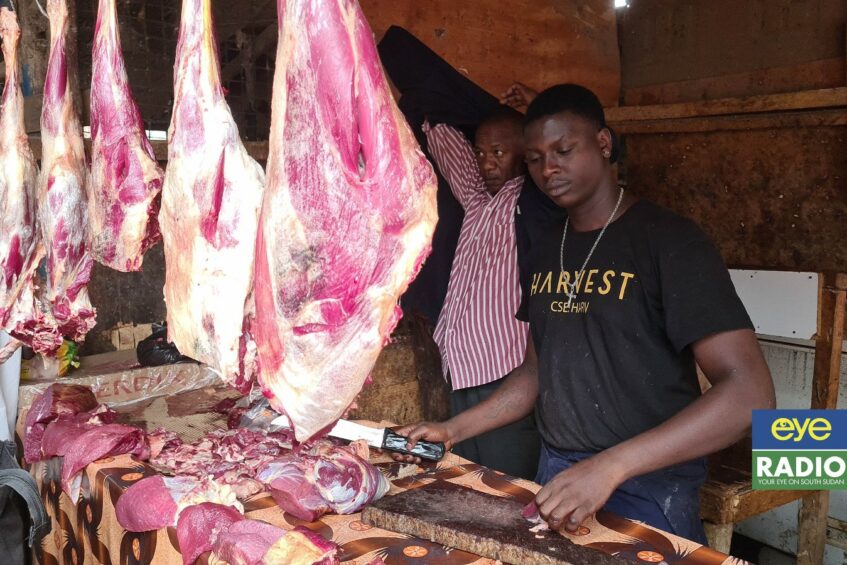
A butcher selling meat at Jebel market in Juba on Friday, March 1st 2024. Photo Credit: Charles Wote | Eye Radio
The government of Central Equatoria State has promised butchers in Juba to address the challenges facing them including reducing the price of meat in the state.
This comes as the heads of butcheries called on the state government to import cheaper cows from Uganda and sell to them at lower prices to stabilize the meat market.
Currently, one kilogram of cow meat has increased from 5,000 to 8,000 South Sudanese pounds, while a kilo of goat or sheep meat costs 10,000 pounds.
Central Equatoria State Minister of Livestock Fisheries and Tourism, Alex Lotio Elias, said the government will try to meet some of the demands of the butchers.
Speaking at Konyo-Konyo Market, Lotio said South Sudan has a lot of Livestock that can sustain its meat market.
“We came to the market to learn about the problems facing butchers in the market, and the biggest of these challenges is the high prices of livestock, which may force them to increase the price of a kilo of meat,” he said.
“We promised them that we would meet with the Butchers Union and stakeholders to try to find a solution to this problem and reduce the price of meat in the state, we have a lot of Livestock, and we want to organize the work of the butchers.”
On Friday, Juba Mayor Flora Gabriel Modi and the Central Equatoria State Minister of Livestock, Fisheries, and Tourism, Alex Lotio Elias, inspected various markets in the capital.
The officials visited Suk Libya, Gudele 1, Custom, Jebel, and Konyo Konyo markets to assess the prices of basic commodities in the market.
Paul Modi, Chairperson for Butchers at Custom Market suggested that the government import cows and sell to traders at subsidized price.
This, according to him, will reduce prices per kilogram in the market.
“We want the government to stand with us in a way that the government has money. Let them import cows for us from Uganda,” he said during the inspection visit.
“Because instead of selling a kilogram at 8,000, if the government brings them, how much will I buy from the government? I will reduce a kilogram to 5,000 so that ordinary people can afford it.”
“Meat is very important. Let the government help us in this area because cows are now very expensive. If you buy a cow at 1 million pounds and you get 800,000 pounds, it means you are at a loss.”
For his part, the Chairperson for Butchers at Konyo-Konyo market, Santo Molle Mario, said insecurity along some highways has blocked them from bringing cattle in other parts of the country.
“Our work has some challenges now because cows are very expensive, and everything is being transacted in dollars,” he said.
“So, the cows that we are selling now are being brought from Aweil; others are being brought from Uganda, and some are imported from this side of Kapoeta.”
“Moreover, other roads are closed due to the security situation in South Sudan. This is causing meat prices to become very expensive.”
In November 2023, Central Equatoria State Butchers Union announced an increase in meat prices across all markets in Juba as poor roads cut off supply of cows from neighboring Pibor Administrative Area.
On Friday, some vendors in Juba have also doubled the prices of basic commodities in the market, citing the high exchange rate against the South Sudan pound.
Mary Nyoka, a table seller at custom market in Juba decries the high cost of vegetables from the wholesalers.
“Currently, we arrange okra in piles and each pile is sold for 110. If we pack it in small bags and sell it for 500, we won’t find customers as they would consider it expensive.”
“Regarding potatoes, we sell a pile for 500, a larger pile for 1000, and the largest package in a bucket we sell for 7,000 or 8000, but still, we find no buyers.”
“The market movement is slow, and due to the rise in the value of the dollar against the pound, sometimes we have to discard vegetables because they spoil without buyers.”
The South Sudan pound has increasingly depreciated against the US currency in recent months, leaving traders with no choice but to adjust prices.
Support Eye Radio, the first independent radio broadcaster of news, information & entertainment in South Sudan.
Make a monthly or a one off contribution.
Copyright 2024. All rights reserved. Eye Radio is a product of Eye Media Limited.